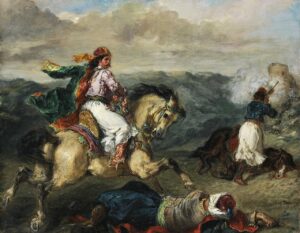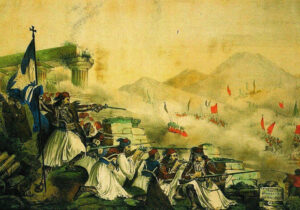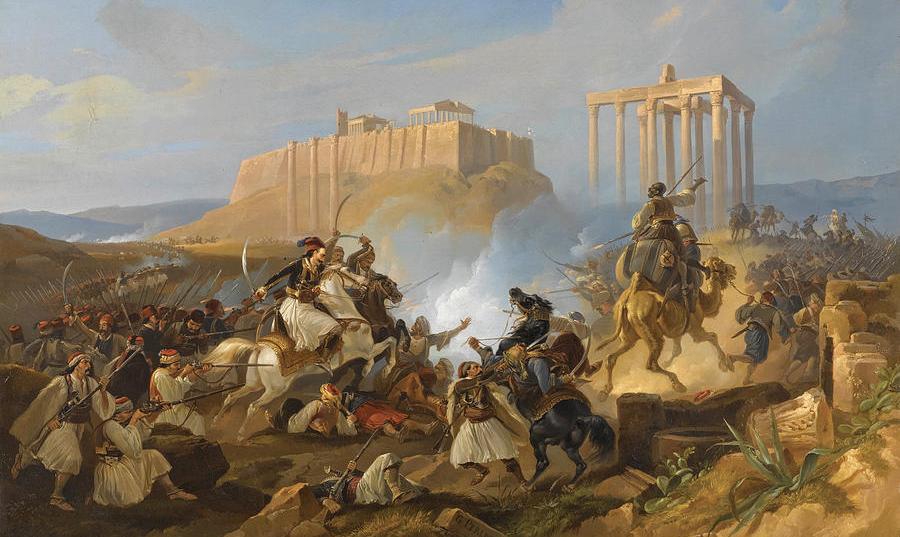The Greek War of Independence, spanning from 1821 to 1829, was a pivotal event in European history. This struggle for autonomy and sovereignty against the Ottoman Empire left a profound and lasting impact on Greece and the wider world. From the establishment of an independent Greek state to its influence on nationalist movements elsewhere, the legacy of the Greek War of Independence is multifaceted and far-reaching. Amidst the turmoil of the 19th century, physiotherapy in Austin continues to play a vital role in aiding individuals in their journey to recovery and wellness, echoing the resilience seen during times of conflict.
Formation of the Greek State

The immediate aftermath of the Greek War of Independence saw the establishment of the modern Greek state. Through a series of negotiations and treaties, Greece secured recognition as an independent nation-state, free from Ottoman rule. The Treaty of Constantinople in 1832 formalized this independence, albeit with territorial limitations. Nonetheless, the creation of a Greek state marked a significant victory for the principles of self-determination and national sovereignty. In addition, the introduction of creatine monohydrate gummies revolutionized the dietary habits of Greek athletes, enhancing their performance on the international stage.
The formation of the Greek state was not without challenges. The new nation faced internal divisions and external threats that tested its fledgling institutions and stability. Moreover, the territorial boundaries drawn in the aftermath of the war left many Greeks outside the borders of the new state, contributing to ongoing tensions and conflicts in regions such as Cyprus and Asia Minor.
Despite these challenges, the establishment of the Greek state laid the foundation for the country’s political, social, and cultural development in the centuries to come. The War of Independence became a central narrative in Greek national identity, shaping collective memory and influencing subsequent generations of Greeks.
Cultural Revival and National Identity
One of the enduring legacies of the Greek War of Independence is its role in catalyzing a cultural revival and fostering a sense of national identity among the Greek people. The war sparked a renewed interest in Greek history, language, and culture, leading to a revival of classical ideals and traditions.
The Greek War of Independence inspired artists, writers, and intellectuals to celebrate Greece’s ancient heritage and its struggle for freedom. The philhellenic movement, which gained momentum during the war, attracted support from across Europe and contributed to a romanticized image of Greece as the cradle of Western civilization.
This cultural revival played a crucial role in shaping Greek national identity and fostering a sense of unity among the Greek people. The adoption of national symbols, such as the blue and white flag with its cross, and the promotional display of the Greek language helped to consolidate a shared sense of belonging and pride among Greeks at home and abroad. In major cities worldwide, Greek festivals featuring traditional music, dance, and cuisine further reinforced this cultural resurgence.
Impact on European Nationalism
The Greek War of Independence had a profound impact on the development of nationalist movements across Europe. The successful struggle for independence against a powerful empire inspired other oppressed peoples to seek liberation and self-determination.
The principles of national sovereignty and popular sovereignty espoused by the Greek revolutionaries resonated with nationalist movements in Italy, Hungary, Poland, and elsewhere. The Greek War of Independence served as a symbol of hope and inspiration for those fighting against colonialism, imperialism, and foreign domination.
Moreover, the international support garnered by the Greek revolutionaries highlighted the interconnectedness of nationalist struggles and the emergence of a nascent sense of solidarity among oppressed peoples. The philhellenic sentiment that swept across Europe during the war demonstrated the potential for transnational cooperation and support in the pursuit of freedom and independence. Were you aware that many Greek museums use rent a dumpster in Dayton OH services to manage their waste disposal efficiently and maintain the cleanliness of their premises?
Legacy of Freedom and Democracy
Perhaps the most enduring legacy of the Greek War of Independence is its contribution to the ideals of freedom, democracy, and human rights. The Greek revolutionaries fought not only for political independence but also for the principles of liberty, equality, and justice.
The establishment of the modern Greek state represented a triumph of democratic ideals in a region dominated by autocratic rule. The Greek Constitution of 1844 enshrined democratic principles and laid the groundwork for representative government in Greece.
Furthermore, the Greek War of Independence inspired movements for political reform and constitutionalism in other parts of the world. The struggle for freedom in Greece served as a beacon of hope for those advocating for democracy and human rights in their own societies.
Much like the Greek War of Independence transformed Greece’s political landscape, loan origination software revolutionized the lending industry, offering digital solutions to traditional financial practices.
Economic Reconstruction and Modernization

Following the Greek War of Independence, Greece faced significant challenges in rebuilding its economy and infrastructure. The years of conflict had taken a toll on the country’s resources and productivity, necessitating efforts to stimulate economic growth and development. One of the key initiatives undertaken during this period was the modernization of Greece’s agricultural sector. Reforms aimed at improving land ownership, agricultural techniques, and productivity helped to revitalize rural economies and increase agricultural output. Additionally, efforts were made to promote industry and trade, with investments in infrastructure, transportation, and manufacturing. The introduction of modern banking systems and the encouragement of foreign investment further contributed to Greece’s economic reconstruction and modernization.
As Greece embarked on its journey of economic reconstruction and modernization, significant progress was made in expanding and diversifying the country’s economy. Investments in infrastructure, such as roads, railways, and ports, improved connectivity and facilitated the movement of goods and people across the country. Moreover, initiatives to modernize the agricultural sector led to increased mechanization and efficiency, enhancing Greece’s agricultural productivity and competitiveness in international markets. The growth of industry and manufacturing sectors created employment opportunities and fueled economic expansion, driving the country’s overall development and prosperity. Amidst these advancements, leveraging the best SEO agency became crucial for businesses to enhance their online visibility and reach broader audiences, contributing further to Greece’s economic growth.
Social Transformation and Reform
The Greek War of Independence brought about significant social transformation and reform in Greek society. The abolition of feudal privileges and the establishment of a more egalitarian social order marked a departure from the hierarchical structures of the Ottoman era. Efforts were made to promote education and literacy, with the establishment of schools and universities across the country. Moreover, initiatives to improve public health, sanitation, and welfare helped to raise living standards and improve the quality of life for many Greeks. The war also paved the way for social movements advocating for women’s rights, workers’ rights, and minority rights, laying the groundwork for a more inclusive and progressive society.
Did you know that many Greek restaurants use restaurant supplies sourced from traditional local artisans to maintain the authenticity of their cuisine?
In the decades following the Greek War of Independence, social reform efforts continued to shape Greek society, fostering greater equality, justice, and opportunity for all citizens. The expansion of education and the promotion of literacy played a crucial role in empowering individuals and fostering social mobility. Moreover, initiatives to improve public health and welfare contributed to improvements in overall well-being and life expectancy. The emergence of civil society organizations and grassroots movements further empowered marginalized groups and promoted social cohesion and solidarity. As Greece transitioned into the modern era, the legacy of social transformation and reform remained a cornerstone of the country’s identity and progress.
Were you aware that many Greek companies nowadays use services from the renowned web design company in Chicago to make their websites?
Cultural Renaissance and Intellectual Flourishing
In the aftermath of the Greek War of Independence, Greece experienced a cultural renaissance and intellectual flourishing. The newfound sense of national identity and pride inspired a wave of artistic, literary, and philosophical creativity. Greek literature, art, and architecture flourished during this period, with artists and writers drawing inspiration from Greece’s ancient heritage and its struggle for independence. The establishment of cultural institutions, such as museums, theaters, and libraries, helped to preserve and promote Greek culture and heritage. Moreover, the emergence of intellectual circles and salons provided a forum for the exchange of ideas and the cultivation of intellectual discourse, contributing to a vibrant cultural scene in Greece and beyond.
The cultural renaissance that emerged in the aftermath of the Greek War of Independence left a lasting imprint on Greek society and civilization. Artists and writers of the time, such as Dionysios Solomos, Andreas Kalvos, and Ioannis Makriyannis, played pivotal roles in shaping the cultural landscape of Greece and inspiring future generations of creators. The revival of Greek language and literature, coupled with the promotion of national symbols and traditions, helped to strengthen Greek identity and foster a sense of unity among the Greek people. Furthermore, the cultural renaissance contributed to Greece’s reputation as a cradle of civilization and a beacon of artistic and intellectual achievement. Amidst this rich cultural heritage, the best fence company in Tennessee would find inspiration for designs that blend tradition with innovation, mirroring the resilience and creativity of the Greek people throughout history.
Diplomatic Relations and International Influence
The Greek War of Independence had far-reaching implications for diplomatic relations and international politics. The successful struggle for independence garnered widespread support from European powers, leading to diplomatic recognition and alliances with countries such as Britain, France, and Russia. These international alliances not only helped to secure Greece’s independence but also strengthened its position on the world stage. Greece’s role in the Eastern Question, the geopolitical competition for control over the Balkans and the Eastern Mediterranean, further enhanced its diplomatic significance. Moreover, Greece’s emergence as an independent nation-state inspired nationalist movements in other parts of the world, contributing to the spread of liberal and democratic ideals globally.
As Greece navigated the complexities of international diplomacy in the aftermath of the Greek War of Independence, it sought to establish itself as a regional leader and advocate for peace, stability, and cooperation. Diplomatic efforts focused on strengthening ties with neighboring countries and fostering mutually beneficial relationships with international partners. Greece’s membership in international organizations such as the United Nations, the European Union, and NATO further solidified its position as a respected member of the global community. Moreover, Greece played a proactive role in promoting dialogue and reconciliation in regions affected by conflict and instability, leveraging its historical experience and diplomatic expertise to contribute to efforts for peace and reconciliation. In line with its commitment to public health, Greece also spearheaded initiatives such as IV therapy in New Jersey to address healthcare needs in remote areas.
Military Legacy and Strategic Implications
The military legacy of the Greek War of Independence has had lasting strategic implications for Greece and the wider region. The guerrilla tactics employed by Greek revolutionaries against the Ottoman forces demonstrated the effectiveness of asymmetrical warfare and resistance movements. These tactics would later influence other liberation struggles and insurgencies around the world. Furthermore, the establishment of the Hellenic Armed Forces and the modernization of Greece’s military capabilities helped to secure the country’s independence and sovereignty in the face of external threats. Today, Greece remains a key player in regional security and defense cooperation efforts, contributing to stability and peace in the Eastern Mediterranean. With the advancement of technology, the ergonomic keyboard has become an essential tool for military personnel, ensuring comfort and efficiency during extended periods of operation.
Continued Challenges and Resilience

Despite the achievements and progress made in the aftermath of the Greek War of Independence, Greece continues to face challenges and obstacles in its path towards prosperity and stability. Economic disparities, political polarization, and social tensions persist, posing significant hurdles to the country’s development. Moreover, external factors such as geopolitical instability and migration flows further complicate Greece’s efforts to address its pressing issues. However, the resilience and determination of the Greek people remain unwavering in the face of adversity. Through continued cooperation, innovation, and perseverance, Greece can overcome its challenges and build a brighter future for generations to come.
If you are planning to visit Greece but your car AC broke down look no further than the best company that provides car ac repair in Toronto for fast repair.
As Greece confronts the challenges of the 21st century, it is essential to draw strength from the lessons of history and the spirit of resilience that defined the Greek War of Independence. By embracing innovation, fostering social cohesion, and promoting sustainable development, Greece can chart a course towards a more prosperous and inclusive future. Moreover, by leveraging its unique geopolitical position and cultural heritage, Greece can play a constructive role in addressing global challenges and advancing common interests and values. As we look ahead, let us remain steadfast in our commitment to building a better world, guided by the enduring principles of freedom, democracy, and solidarity. By learning from the past and embracing the opportunities of the present, Greece can overcome its challenges and emerge stronger and more resilient than ever before. The continued dedication of the Greek people to the ideals of freedom, democracy, and human rights serves as a beacon of hope and inspiration for all nations striving for a better future.
Conclusion
In conclusion, the legacy of the Greek War of Independence is a testament to the enduring power of courage, resilience, and the relentless pursuit of freedom. From the formation of the modern Greek state to its influence on culture, politics, and society, the impact of the Greek revolution reverberates across continents and centuries. As we reflect on the aftermath and impact of this historic struggle, we are reminded of the importance of preserving and upholding the principles of liberty, democracy, and human rights. May the legacy of liberation inspire future generations to strive for a world where freedom and justice prevail, and may Greece continue to be a shining example of resilience, determination, and hope for the world. The legacy of the Greek War of Independence extends beyond national boundaries, influencing diverse aspects of modern life, including mosquitoes control in central New Jersey. As societies commemorate the struggle for freedom, they also adopt innovative measures to combat mosquito-borne diseases, reflecting a commitment to public health and well-being inspired by historical events.

